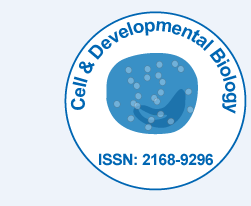
Cell & Developmental Biology
Open Access
ISSN: 2168-9296

ISSN: 2168-9296
Rebecca A Wingert
Rebecca A Wingert
Department of Biological Sciences
University of Notre
USA
Stem Cell and Regenerative Medicine Center, Faculty 2015–Present
Association for Women in Science (AWIS), Notre Dame Chapter, Faculty Advisor 2013–Present
Gallagher Family Professorship in Stem Cell Biology 2012–Present
Integrated Biomedical Sciences (IBMS) Graduate Program, Faculty 2012–Present
Chemistry–Biochemistry–Biology–Interface (CBBI), Faculty 2011–Present
National Science Foundation Summer Research Experiences for Undergraduates (NSF REU), Biological Sciences at University of Notre Dame, Faculty 2010–Present
Assistant Professor, Department of Biological Sciences, Notre Dame 2010–Present
Harvard Stem Cell Institute, Affiliated Faculty 2008–2010
Board of Tutors in Biochemical Sciences, Harvard University 2008–2010
Instructor in Medicine, Harvard Medical School 2007–2010
Continuing Education/Special Programs Instructor, Harvard University 2003–2007
Postdoctoral Fellow, Harvard Medical School and Massachusetts General Hospital 2005–2010
Ph.D. Cell and Developmental Biology, Harvard University 1999–2005
B.A. English, B.S. Biology, Muhlenberg College 1995–1999
The Wingert Lab studies the genetic and molecular mechanisms that control how renal stem cells accomplish kidney formation, impact kidney homeostasis, and facilitate kidney regeneration following organ injury. Understanding these processes has broad implications for identifying the basis of renal birth defects and the responses to tissue damage that lead to kidney disease. Kidney diseases are a growing global healthcare issue: they affect epidemic numbers of children and adults worldwide, and are steadily climbing in incidence. Kidney diseases can be treated with renal replacement through dialysis or organ transplant, but both strategies require life-long medical management and can involve significant complications. Knowledge obtained from studying the basic biology of the renal system can provide a valuable way to discover innovative therapies for kidney disorders.
Research in the Wingert Lab centers around two major areas:
Kidney Development Research: How do renal stem cells arise during development? How are nephrons constructed from renal stem/progenitor precursors? We are seeking to identify the genetic requirements for making renal cells. We utilize classical forward genetic screening and chemical genetics to study the molecules that affect in nephron formation. One benefit of these integrated approaches is that we can discover essential genes and signaling pathways that have never been implicated in renal progenitor biology. In addition, we perform expression studies to identify factors expressed by kidney cells during nephrogenesis, then assign their functional roles using reverse genetics, including knockdown and genome targeting strategies, as well as overexpression techniques to examine gain-of-function.
Kidney Regeneration and Aging Research: How can damaged nephron components be replaced? Are there renal stem cells that can facilitate treatment of renal diseases? Can differentiated nephron cells be induced to regenerate damaged nephrons? Can the activation of kidney developmental pathways facilitate regeneration? How does the kidney age, and is the aging of renal stem cells a contributing factor to the incidence of kidney disease? We are using models of nephron injury in the embryo and adult zebrafish to discover the cell and molecular events that are required for nephron regeneration during the lifetime of the animal. Along with our nephron development studies, it is our hope that these lines of inquiry will shed novel insights into the activities of kidney cells and guide the creation of new therapeutics.